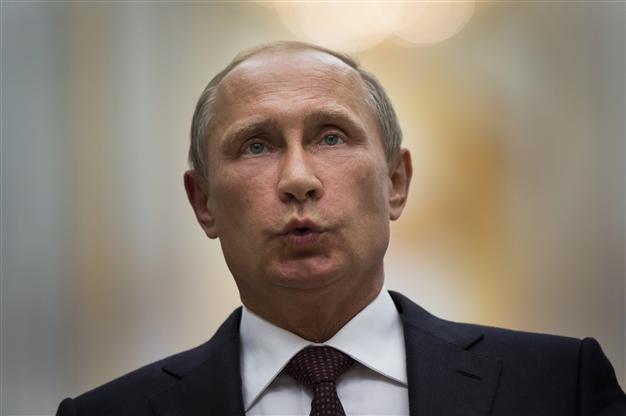Beleaguered Ukraine calls truce in pro-Russia revolt
KIEV - Agence France-Presse

In this Wednesday, Aug. 27, 2014 file photo, Russian President Vladimir Putin speaks to the media after his talks with Ukrainian President Petro Poroshenko in Minsk, Belarus. AP Photo
Beleaguered Ukrainian President Petro Poroshenko announced Sept. 3 that he and Russia's Vladimir Putin had agreed a surprise truce in Ukraine's four-month war with pro-Moscow rebels.
But the Kremlin immediately denied any formal agreement and stressed that Russia played no role in the conflict despite Western claims that it has orchestrated the insurgency tearing apart the ex-Soviet state.
Kiev's announcement raised hopes of an end to fighting that has killed at least 2,600 people and driven relations between Russia and the West to their lowest ebb since the Cold War.
Poroshenko's office said the deal with Putin was reached in a telephone conversation. They struck "an agreement for a permanent ceasefire in Donbass (eastern Ukraine)," a brief statement said. "An understanding was reached concerning steps that will help to establish peace."
But doubts quickly followed the announcement, which came in advance of a NATO summit on Thursday at which the Western military bloc is expected to approve a new rapid reaction force for defending eastern Europe.
The Kremlin denies giving more than moral support to the insurgents in eastern Ukraine and said there was no official truce agreement.
"Putin and Poroshenko really did discuss steps that would lead to a ceasefire between rebels and Ukrainian troops," Kremlin spokesman Dmitry Peskov told the RIA Novosti state news agency.
"But in principle Russia cannot agree on a ceasefire as it is not a participant in the conflict."
U.S. President Barack Obama - on a highly symbolic visit to former Soviet republic and new NATO member Estonia - said it was "too early too early to tell what this ceasefire means."
"There is an opportunity here. Let's see if there is a follow up," Obama said.
The Ukrainian presidency itself partly backtracked by amending its initial statement to remove the word "permanent." But it left the rest of the ceasefire announcement intact and did not comment on reasons for the change.
Neither was it clear if rebel commanders who have been routing Ukraine's army in recent fighting were ready to comply. Obama used his Estonia visit to announce the deployment of extra US airforce units to defend the tiny Baltic state's border with Russia. "Estonia will never stand alone," he said.
This comes in addition to a decision expected at the 28-nation NATO summit in Wales on creating a 4,000-strong force that could be deployed within two days to meet any Russian military movements in eastern Europe.
NATO's tough talk is being matched by Russia's announcement on Sept. 2 that it would review its military strategy to consider the Western alliance a "threat."
